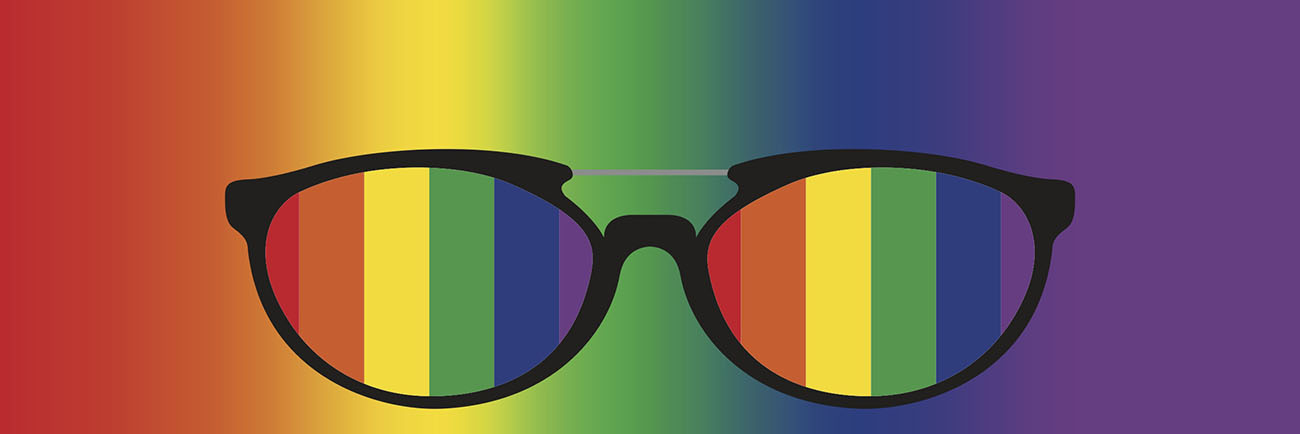50 Years and Still Fighting.
VocalEye is proud to describe the Vancouver Pride Parade for people who are blind and partially sighted. Special thanks go to Richard Marion, a member of the blind community, for his original request to describe this spectacular public event and to our partners at the Vancouver Pride Society for making this event more accessible.
A celebration. A protest. A party. A place to take up space. An opportunity to don our finest and shiniest. A chance to recognize how far we have come and to reflect on where we need to go from here.
Headsets and priority seating will be provided free of charge for people with vision loss in the accessibility area on Beach Avenue (at the foot of Broughton on the water side of the street) from 11 am to 3 pm on Parade Day. Sighted companions can listen, too, just bring an extra set of earbuds! Seating and equipment are limited. Reservations required. Contact buddies@vocaleye.ca
Free shuttle service available to and from the Accessibility Area this year thanks to the Vancouver Pride Society and TransLink!
The shuttle will bring passengers one block away from the Accessible Parade Viewing Area and is beside the Sunset Beach Festival.
The shuttle will run between Waterfront Station and Beach at Jervis on Parade Day at the following times:
Departure times from Waterfront Station on Cordova at Granville Street:
- 9:30 am
- 10:15 am
- 10:55 am
Boarding time begins 15 minutes before departure.
Return times from Accessible Viewing Area at Beach and Jervis:
- 4:00 pm
- 5:00 pm
- 6:00 pm
Boarding time begins 15 minutes before departure.
Full details on the VPS website’s Accessibility Page
Described by Eileen Barrett and Rick Waines
The Accessibility Area features seating, shade and accessible washroom facilities.
Free bottled water is in short supply so we encourage you to bring your own. Be sure to dress for the weather as necessary and don’t forget your sunscreen! We’ll have light snacks and festive treats to share.
The Vancouver Pride Parade is one of the most beautiful, diverse and successful LGBTTQ celebrations in the world. Beginning as a protest march in 1978, the Vancouver Pride Festival has evolved into the largest parade in Western Canada, and the 5th largest Pride celebration in the world. What began as a small event in 1981 has now grown into a landmark parade encompassing hundreds of people and city-wide festival attracting over 650,000 people from all four corners of the world to the streets of Vancouver. It is a chance for people to come together to show their support to the lesbian, gay, bisexual and transgender community and to celebrate acceptance and the freedom to be who you are, no matter your ethnicity, sexuality, size, shape or ability.
50 Years And Still Fighting
What makes a moment?
In 1967, Everett Klippert was declared a dangerous sexual offender and sentenced to indefinite detention – life in prison – for consensual homosexual sex, otherwise known as gross indecency, sparking a national conversation.
On May 14, 1969, Bill C-150 passed in the House of Commons, ‘decriminalizing’ private homosexual acts between consenting men over the age of 21. Klippert was not released until 1971.
The focus on private versus public acts led to intensified Canada-wide policing of queer communities and sex workers, particularly those who did not have access to private spaces. From bar raids to cruising busts, the 1970s witnessed an upswing of violence and discrimination countered by passionate advocacy and radical activism.
This year, as people across the country recognize the 50th Anniversary of the passing of Bill C-150, the Criminal Law Amendment Act, we ask ourselves what makes a moment? Do we focus on a single snapshot in time or the innumerable collective actions made by many which allowed progress to occur? For that matter, was Bill C-150 progress?
On August 28, 1971, during the We Demand demonstrations, activists on Parliament Hill in Ottawa and in front of the Vancouver Court House read out a list of 10 demands. Aimed at ending legal discrimination against lesbians and gays, these demands sought to address the limits of Bill C-150. While We Demand was the first national demonstration by LGBTQ2+ communities, it was not the last. What has followed from the 1969 Criminal Law Amendment Act has been 50 years of fighting.
Progress is not a singular event, but the story of our collective dreams, actions and battles for liberation across time. As we recognize the 50th Anniversary of partial decriminalization, we invite you to consider the obstacles, opportunities, and possibilities that radiated out from that historical moment. As we recognize the monumental gains won in the last half-century, we are reminded that it has been 50 years and we are still here.
Fighting.







